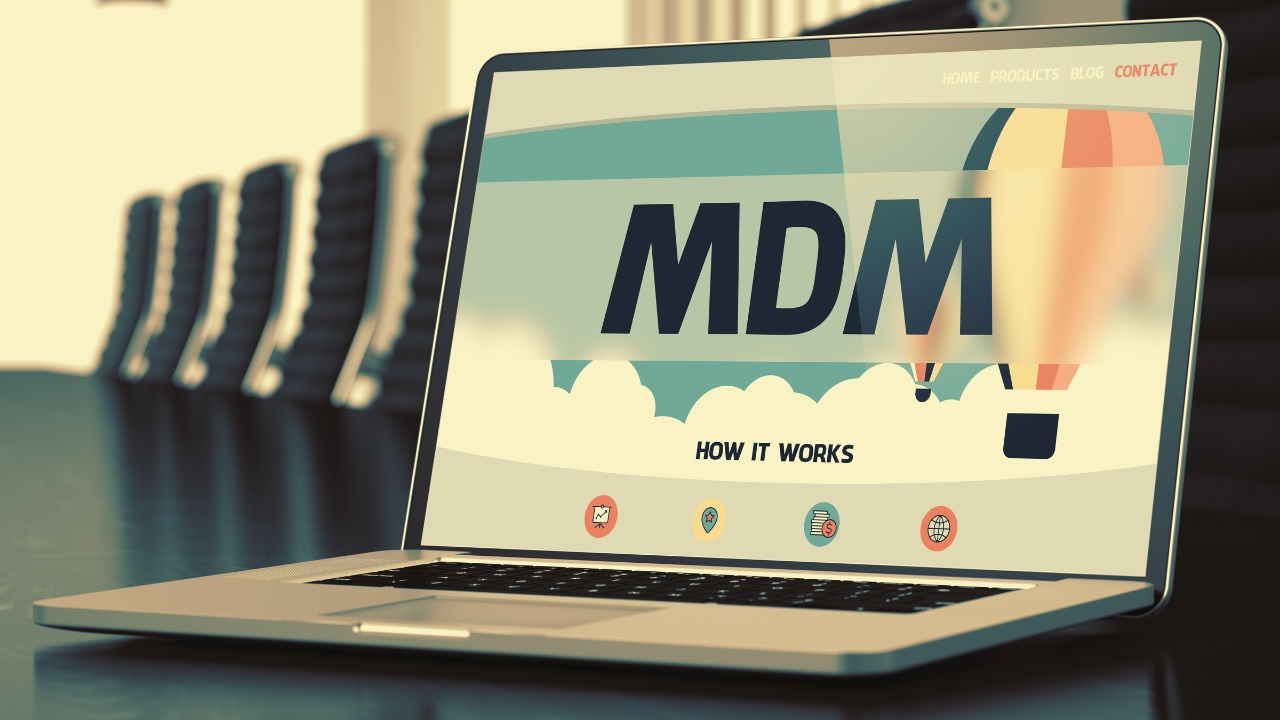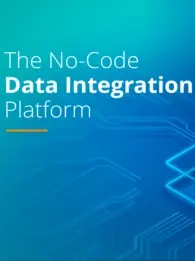
In today’s age of big data, making the most out of your data can feel overwhelming.
Not only do many organizations have more data than they know what to do with, but they also often struggle to gain insights from some of the most valuable data in their possession, leading to many of their crucial data assets going unused.
According to a recent study by Seagate, just 32% of data available to enterprises is put to work, leaving 68% of organizational data unleveraged in a world where data is central to business success.
When organizations fail to leverage their most valuable – or master data – they miss out on an opportunity to outperform competitors in areas like product development, customer satisfaction, and marketing ROI.
Master data management (MDM) tools are crucial for any organization looking to effectively use their master data for driving growth, improving efficiency, and gaining a competitive edge in their field.
What is Master data?
Master data is the set of core instructions that tells this machine how its essential parts function and interact. It's the foundation upon which all other business data – the raw materials the machine processes – is built.
Master data acts as the central registry for an organisation, providing a consistent and accurate record of everything that's essential for smooth operations. It focuses on critical entities that drive business activities.
These entities can be broadly categorized into four main groups:
- Parties: This includes customers, suppliers, employees, and any other individuals or organizations the business interacts with. Master data for parties would include contact details, demographics, and roles within the organization.
- Products: This category covers all the goods and services a business offers. Product master data would include details like product descriptions, specifications, pricing, and inventory levels.
- Locations: This refers to physical places relevant to the business, such as stores, warehouses, or manufacturing facilities. Location master data might include addresses, geographical coordinates, and associated operational details.
- Financial Structures: This encompasses financial entities like cost centers, ledgers, and budgets. Financial master data ensures accurate financial reporting and analysis.
Since master data serves as the foundation for various business processes, it’s important to make sure that master data is accurate, consistent and complete across all departments and systems within an organization.
Inaccurate master data can lead to errors in reporting, inefficiencies in operations, and poor decision-making, limiting its usefulness in providing context for transactions and analysis.
While relatively static, master data should also be updated periodically to reflect any changes in the underlying entities (e.g., a customer's new address).
All of this can be handled by many of the best Master data management (MDM) tools and software solutions available today.
What are Master Data Management (MDM) tools?

MDM tools are software applications designed to help organizations create, maintain, and manage their master data.
As discussed earlier, master data is the core, high-quality information about critical business entities like customers, products, locations, and financial structures.
MDM tools play a crucial role in ensuring this data is:
- Accurate (free from errors and inconsistencies).
- Consistent (represented identically across all departments and systems within the organization).
- Complete: (captures all relevant information about a business entity).
- Timely: (updated regularly to reflect changes).
MDM tools can connect to various data sources within an organization, extracting and consolidating master data from disparate systems like CRMs, ERPs, and legacy databases.
They also clean and standardize the collected data by identifying and correcting errors, formatting data into a consistent structure, and enriching data with additional details from external sources.
Many organizations rely on MDM tools when developing a framework for managing data governance and integration. They allow organizations to establish rules and workflows for data creation, modification, and approval, ensuring data quality and compliance with regulations.
MDM tools facilitate the secure sharing of master data with authorized users and systems across the organization. They ensure everyone has access to the latest and most accurate version of the data.
Benefits of MDM Tools
Master Data Management (MDM) tools offer a range of advantages for organizations looking to improve data quality, streamline operations, and make better use of their business information. Here are some of the key benefits of using MDM tools:
1. Enhanced Data Quality
MDM tools act as a central hub, consolidating data from various sources and eliminating duplicates and inconsistencies. This leads to cleaner, more accurate master data that provides a reliable foundation for all business processes. Improved data quality translates to better reporting, stronger analytics, and ultimately, more informed decision-making.
2. Increased Operational Efficiency
Managing data across multiple systems can be cumbersome and time-consuming. MDM tools automate many data management tasks, such as data cleansing, standardization, and synchronization. This frees up IT staff to focus on other critical tasks, leading to streamlined operations and improved overall efficiency.
3. Improved Customer Relationships
MDM tools ensure consistent and accurate customer data across all touchpoints within an organization. This empowers businesses to deliver personalized customer experiences, leading to higher customer satisfaction and loyalty. For instance, with accurate customer data, marketing teams can send targeted campaigns and sales teams can tailor their interactions to individual customer needs.
4. Stronger Regulatory Compliance
Many industries have strict data privacy regulations in place. MDM tools help organizations comply with these regulations by providing a framework for data governance and data security practices. They can help track data access, ensure proper data retention policies, and facilitate data deletion requests when necessary. Read: How does Master Data Management Improve Business Security?
5. Reduced Costs
Inaccurate or inconsistent data can lead to costly errors in reporting, marketing campaigns, and other business processes. MDM tools help minimize these errors by improving data quality. Additionally, by streamlining data management tasks, MDM tools can free up IT resources, potentially leading to cost savings.
6. Improved Decision-Making
With access to clean, accurate, and consistent data, businesses can make more informed decisions across all departments. From product development and marketing strategies to financial planning and resource allocation, MDM tools empower organizations to leverage their data effectively for better decision-making.
Who needs MDM Tools?
Any organization that relies on accurate and consistent data across various departments can benefit from MDM tools. This is particularly true for businesses in sectors like:
- Retail: MDM tools ensure accurate product information for smooth inventory management, targeted marketing campaigns, and improved customer experience.
- Finance: Maintaining consistent customer and financial data is crucial for accurate reporting, regulatory compliance, and risk management.
- Healthcare: Accurate patient data is essential for effective treatment planning, billing, and compliance with healthcare regulations.
By implementing MDM tools, organizations can establish a solid foundation for data-driven decision-making, optimize operations, and gain a competitive edge in today's data-centric enterprises.
Best Master Data Management (MDM) Tools for 2024
There are a variety of MDM tools available today, each with its own set of features and solutions for your specific needs and budget.
In this list, we’ll be counting down ten of the best MDM tools available today, delving into the features that make them among the top-rated MDM tools on the market.
Syndigo MDM
Syndigo MDM is a Master Data Management (MDM) tool known for its cloud-native architecture and focus on multi-domain functionality. The tool goes beyond just managing product data (PIM) or customer data (CDM), providing a unified platform to manage all essential business entities, and fostering better data consistency and collaboration across departments. It also offers tools for data governance, ensuring data quality and compliance with internal policies and external regulations. This includes features for data validation, workflow management, and user access control.
Syndigo MDM positions itself as an MDM tool that goes beyond just managing data. Being a multi-domain MDM solution, it can manage various types of master data across your organization, while its cloud-native architecture also allows Syndigo MDM to scale easily as your business grows and your data needs evolve. and handle large volumes of data efficiently. Syndigo MDM integrates seamlessly with Syndigo's PIM and Digital Asset Management (DAM) solutions, providing a comprehensive platform for managing all your product-related information. If you're looking for a cloud-native MDM solution that offers a multi-domain approach and integrates seamlessly with product information management functionalities, Syndigo MDM is definitely worth taking into consideration.
Profisee
Profisee is a leading Master Data Management (MDM) platform designed to help organizations manage and govern their critical business data while ensuring accuracy, consistency, and completeness across various departments and systems. Unlike some MDM solutions with a rigid structure, Profisee prides itself on flexibility. It can be configured to manage various master data domains, including customers, products, locations, and suppliers. It can also offer flexible deployment options, including Software-as-a-Service (SaaS), Platform-as-a-Service (PaaS), hybrid, and on-premises deployments. This allows organizations to choose the deployment model that best suits their needs and infrastructure preferences. This flexibility allows Profisee to cater to businesses with diverse data management needs, from simple to complex.
Built for the cloud, Profisee also offers scalability, accessibility, and faster deployment compared to other on-premise MDM solutions. Users can access the platform from anywhere and benefit from automatic updates and maintenance. If you're looking for a cloud-native MDM solution that offers a multi-domain approach and integrates seamlessly with product information management functionalities, Syndigo MDM is definitely worth exploring.
Ataccama ONE
Ataccama ONE is a unified data management platform that combines MDM functionalities with Data Quality and Data Catalog modules to help organizations manage their master data. The platform can manage various master data domains beyond just products, including customer, supplier, location, and other critical entity data, providing a holistic view of your business entities. Its integrated data catalog offers a central repository for information about all your data assets, facilitating data discovery and promoting better data utilization across the organization.
Ataccama goes beyond MDM by offering comprehensive data quality management tools. This includes data profiling, anomaly detection, and data monitoring capabilities to ensure the overall quality of your data ecosystem.The platform also provides offers robust data cleansing capabilities to identify and correct errors, inconsistencies, and missing data, along with tools for data standardization to ensure consistent formatting across all systems. The combined functionalities of MDM, Data Quality, and Data Catalog make Ataccamma ONE a comprehensive solution for managing all aspects of your data
Precisely EnterWorks
Precisely EnterWorks is a comprehensive MDM solution designed to manage and govern critical business data across various domains. Unlike solutions focused solely on product data, EnterWorks caters to a broader spectrum, including customers, locations, suppliers, and more. This multi-domain approach allows organizations to create a unified view of their business entities and establish consistent data management practices across the enterprise. The platform also tracks the origin and movement of data throughout your systems, providing valuable insights for data lineage and audit purposes. This can be crucial for regulatory compliance and troubleshooting data quality issues, allowing you to enrich your master data with additional information and provide a more comprehensive view of your business entities.
EnterWorks excels at managing data across various domains, whether it be customers, products, suppliers, locations, pr materials. It provides a range of functionalities for establishing data governance policies and workflows for all data types, making it easy to maintain data integrity, promote data ownership within the organization, and maintain compliance with regulations. EnterWorks also emphasizes user-friendliness with no-code/low-code configuration capabilities, allowing business users to participate in data stewardship tasks without extensive technical expertise. If you're looking for a multi-domain MDM solution that prioritizes data governance, data integration, and user-friendliness, Precisely EnterWorks is one of the best MDM solutions out there.
PiLog MDRM
PiLog MDRM is a software solution designed for Master Data Management, specifically focusing on managing data within the supply chain, enterprise, and asset lifecycle domains. The platform can handle data management for various domains, including products, customers, suppliers, and locations, allowing organizations to consolidate and manage their core business entity data within a single platform. The platform also offers functionalities for data registration, including creating new records and assigning them to specific business units or plants. This can help ensure data accuracy and consistency before integration into various systems.
PiLog MDRM helps identify and eliminate duplicate records within your master data, leading to cleaner and more accurate data. The platform provides tools for data cleansing to identify and correct errors, inconsistencies, and missing data. It also offers features for data standardization to ensure consistent formatting across all systems, as well as reports and analytics dashboards to track data quality metrics, identify data management trends, and monitor overall data governance practices. PiLog MDRM is known for its user-friendly interface too, making it accessible to users with varying levels of technical expertise, simplifies data management tasks making the platform good option for organizations seeking a simpler and more efficient way to manage master data.
Reltio
Reltio’s cloud-native Connected Data Platform that goes beyond traditional MDM functionalities. It acts as a central hub for unifying data from various sources, including ERP, CRM, PIM, and external data providers, providing a 360-degree view of your business entities in real time. The platform facilitates the consolidation, cleansing, and enrichment of data from various sources, using graph technology to connect data points and establish relationships between entities to provide a more comprehensive view of your business data. Reltio can also manage data across various domains, including customers, products, locations, suppliers, and assets. This allows organizations to consolidate and govern all their critical business entity data within a single platform.
Unlike traditional MDM solutions that focus on siloed data management, Reltio emphasizes creating a holistic view of your business entities by connecting data points from various sources. The platform also has a suite of tools for data cleansing, standardization, matching, and deduplication for your data, ensuring the accuracy, consistency, and completeness of your master data across all systems. By leveraging connected data and data enrichment, Reltio helps generate actionable insights that can be used to improve decision-making across various departments within the organization.
SAP Master Data Governance
SAP Master Data Governance (MDG) stands out as a key player in the Master Data Management (MDM) space, particularly for businesses heavily invested in the SAP ecosystem. The platform can manage data across various domains, providing a holistic view of your business entities within the SAP ecosystem to streamline data management processes and ensure consistency across all SAP applications. Since it integrates tightly with existing SAP applications, such as SAP S/4HANA, SAP ERP Central Component (ECC), and SAP Customer Relationship Management (CRM), it provides a unified data management experience for organizations that rely heavily on SAP software. It also helps identify and merge duplicate records within your SAP data, leading to cleaner and more accurate master data.
While SAP applications are generally known for a certain level of complexity, SAP MDG strives for a user-friendly interface. The platform comes with built-in workflow functionalities for managing data creation, approval, and change processes, making it simple to ensure data governance and adherence to established data management policies. The platform also provides tools to automate data cleansing and identify and correct errors, inconsistencies, and missing data within your data points. This makes it ideal for data governance, enabling your data teams to ensure data integrity and compliance within your SAP environment at all times.
IBM InfoSphere
IBM InfoSphere has been a top master data management tool for years, offering accurate and actionable insights that help businesses access instant value from their business-critical data. The platform provides a rich set of tools for data quality management, including functionalities for data cleansing to identify and correct errors, data standardization tools to ensure consistent formatting across all systems and data matching and deduplication features to help eliminate duplicate records. It also prides itself on centralized data management, allowing you to consolidate business data from across the enterprise in a highly accurate view and attain a virtual golden profile of master data through its virtual MDM.
BM InfoSphere MDM is designed to scale with your needs. It offers a flexible architecture that can be deployed on-premise, in the cloud, or in a hybrid model. This allows you to choose the deployment option that best suits your infrastructure and preferences. For organizations heavily invested in the IBM ecosystem, a valuable benefit of IBM InfoSphere MDM is its integration with IBM's analytics solutions. By combining MDM with analytics capabilities, you can gain a more comprehensive understanding of your customers, products, and overall business operations. The platform integrates seamlessly with various business applications ensuring all systems have access to the latest and most accurate master data while eliminating inconsistencies and improving data-driven processes across the organization.
Pimcore MDM
Pimcore’s cloud-native MDM software offers a variety of functionalities that enable you to manage all aspects of any master record, including hierarchy, structure, validation, versioning, and enrichment with attributes, descriptions, translations, and documentation. Pimcore's MDM features provide a solid foundation for managing core master data entities. The platform offers tools for data modelling to define the structure of your master data, and provides functionalities for data management tasks such as data creation, editing, and versioning. It also consolidates functionalities for MDM, PIM, CDM, and digital experience management within a single platform, simplifying data management and streamlining operations for organizations that require these combined functionalities.
Using MDM in PIMCore allows you to manage data from a single location, which reduces data redundancy, improves data reliability, and provides useful insights. The PIMCore MDM system also allows you to merge data from different sources and gives you access to the single data repository to add and update the records that reflect changes across all channels. And the platform’s faster implementation times and user-friendly interface make Pimcore one of the most accessible MDM solutions for organizations with varying levels of MDM experience.
Informatica MDM Platform
With a reputation as a market leader and a host of five-star reviews, Informatica MDM is largely considered to be one of the best MDM solutions on the market today. The platform goes beyond basic data management by incorporating functionalities for data integration, data quality, and data governance to provide a holistic approach to data stewardship It also automates how data is managed and improved from capture to consumption, allowing you to discover untapped sources of relevant data and models the optimal format for managed attributes. Informatica manages any data of any type from any source too, ensuring all the data at your company’s disposal is high quality, integrates easily into multiple business processes, and
delivers meaningful insight. It connects transaction, interaction, and IoT data as well as third-party supplemental data to support more ambitious data-driven challenges. Informatica’s MDM solution delivers the market-leading foundation to build that trusted 360-degree view of their data. Powered by Graph technology, it can provide intuitive ways to look at your data, discover relationships and drive new actionable insights so you can predict the next best action. Companies across the globe rely on Informatica MDM to give business users easy access to the data that drives their strategic decisions about cutting costs, increasing revenues, improving operations, reducing risk, and capitalizing on opportunities. As the industry’s only true end-to-end MDM solution, it incorporates data integration, data quality, data governance, business process management, and master data management on a single vendor-agnostic platform to ensure faster time-to-value.












